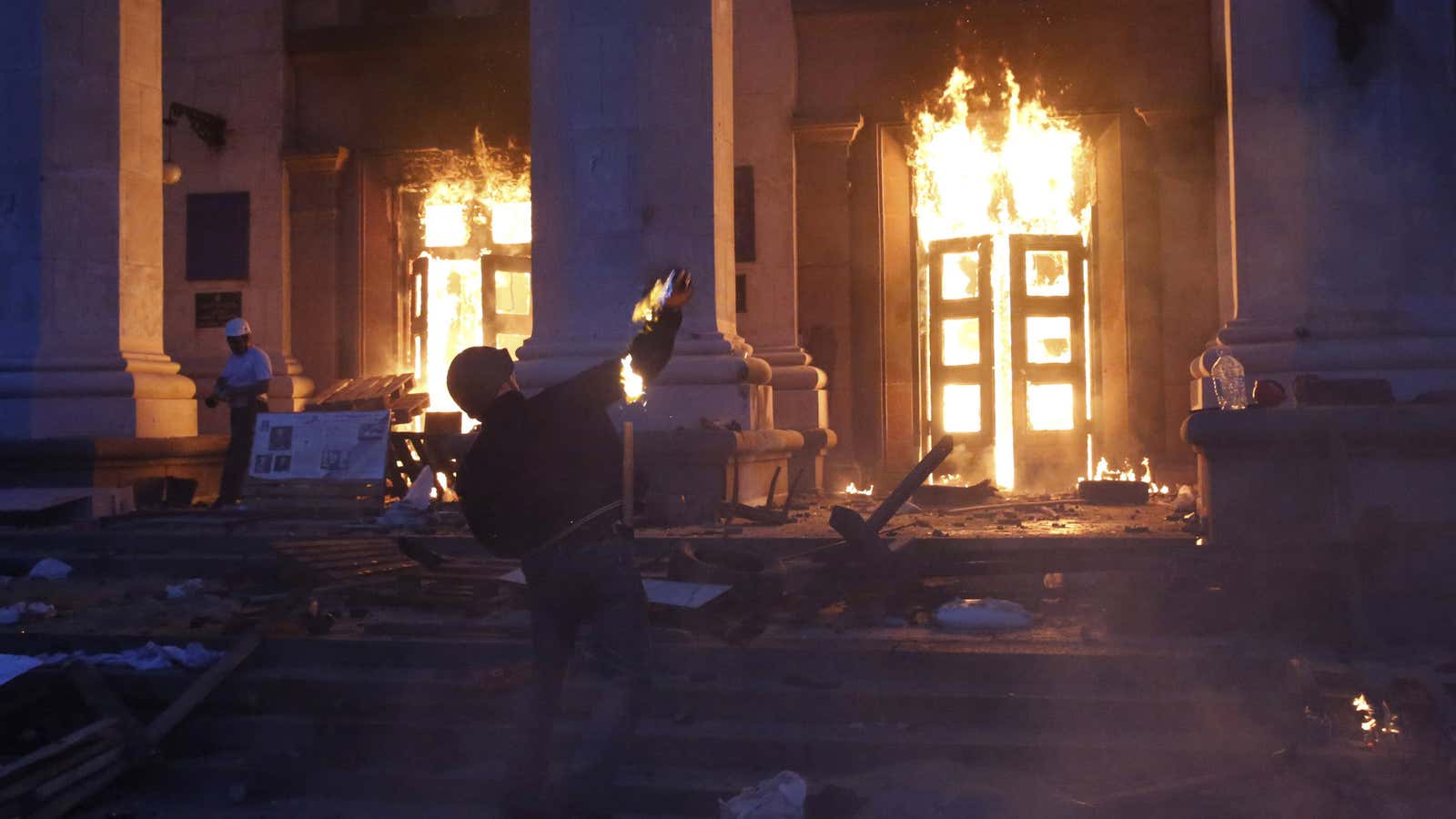The past 24 hours have put Russia and the West on a direct collision course over the crisis in Ukraine. A mid-April agreement in Geneva between Ukraine and the US, EU, and Russia to “de-escalate tensions and restore security” is now truly in tatters, each side blaming the other for inciting the violence that has spread throughout Ukraine’s Russian-speaking regions.
Against the backdrop of increasingly bloody battles across Ukraine, the war of words between Russian and Western officials has pushed the sides closer than ever to open confrontation. Yesterday, two Ukrainian military helicopters were shot down near Slovyansk, killing the pilots on board. Meanwhile, in Odessa, dozens of pro-Russian separatists died when the building they were occupying was set ablaze (pictured above).
In response, Russia’s foreign ministry issued a provocative statement (link in Russian) condemning the Ukrainian military’s “punitive” efforts to retake cities seized by pro-Russian militias. The statement suggested “English-speaking foreigners” were fighting on behalf of the government in Kiev, with the alleged blessing of the US State Department.
Today, Dmitry Peskov, Russian president Vladimir Putin’s spokesman, ramped up the rhetoric even further. He said that Russia could no longer exert control over the separatist militias in eastern Ukraine, which could be read as a tacit admission that, as in Crimea, it previously issued directions to the purportedly spontaneous, locally organized “self-defense” forces. Peskov also cast doubts on Ukraine’s presidential election scheduled for May 25, calling it “absurd” to consider holding a poll amid the violence.
This was the clearest indication of a position only assumed up to now. The election is intended to draw a line under the reign of ousted Ukrainian president Viktor Yanukovych, the first step in establishing a new government in Kiev with, as seems likely, stronger Western sympathies. At a joint press conference in Washington yesterday, the May 25 poll was a major talking point for US president Barack Obama and German chancellor Angela Merkel.
“If, in fact, we see the disruptions and the destabilization continuing so severely that it impedes elections on May 25th, we will not have a choice but to move forward with additional, more severe sanctions,” Obama said. Merkel stressed that May 25 is a “very crucial date,” and agreed that tougher sanctions against Russia were “unavoidable” if preparations for a poll on that day were disrupted.
Thus, the US and Europe have lowered the bar for broad-based sanctions targeting key sectors like finance and energy, striking directly at the source of Putin’s power. This so-called “nuclear option” would also produce plenty of collateral damage in the West, particularly for European countries that rely on Russian energy imports.
The trigger for an all-out economic war between Russia and the West could come well before the 25th. For all of its concern about the legitimacy of Ukraine’s presidential poll, Russia hasn’t said much about the hastily arranged, Crimea-style referendum on independence to be held on May 11 by the leaders of the self-proclaimed People’s Republic of Donetsk. Merkel noted during yesterday’s press conference that a meeting of EU foreign ministers on May 12 “is going to play a very important role” when it comes to crafting a response to any new Russian provocations.
The Donetsk referendum previously seemed like a useful starting point for a campaign to destabilize Ukraine ahead of the presidential poll two weeks later. The latest spike in violence, and the gruesome scenes in Odessa in particular, appears to have accelerated the timetable. The Kremlin’s recent comments directly challenge the US and Germany to impose stricter sanctions on Russia. In a serious escalation of tensions, Putin is openly daring Obama, Merkel, and other Western leaders to put up or shut up.




